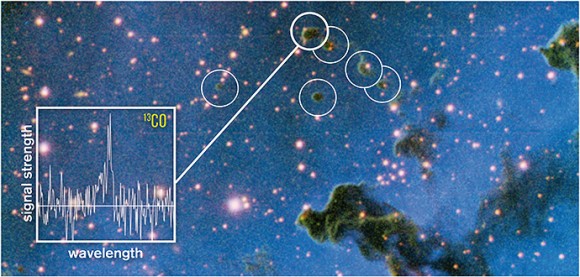Science
Related: About this forumRogue Planets Could Form On Their Own in Interstellar Space
by NANCY ATKINSON

Astronomers have found that tiny, round, dark clouds called globulettes have the right characteristics to form free-floating planets. The graph shows the spectrum of one of the globulettes taken at the 20-metre telescope at Onsala Space Observatory. Radio waves from molecules of carbon monoxide (13CO) give information on the mass and structure of these clouds. ESO/M. Mäkelä.
Free-floating rogue planets are intriguing objects. These planet-sized bodies adrift in interstellar space were predicted to exist in 1998, and since 2011 several orphan worlds have finally been detected. The leading theory on how these nomadic planets came to exist is that they were they ejected from their parent star system. But new research shows that there are places in interstellar space that might have the right conditions to form planets — with no parent star required.
Astronomers from Sweden and Finland have found tiny, round, cold clouds in space that may allow planets to form within, all on their own. In a sense, planets could be born free.
The team of astronomers studied the Rosette Nebula, a huge cloud of gas and dust 4,600 light years from Earth in the constellation Monoceros. They collected observations in radio waves with the 20-meter telescope at Onsala Space Observatory in Sweden, in submillimetre waves with APEX in Chile, and in infrared light with the New Technology Telescope (NTT) at ESO’s La Silla Observatory in Chile.
”The Rosette Nebula is home to more than a hundred of these tiny clouds – we call them globulettes”, says Gösta Gahm, astronomer at Stockholm University, who led the project. “They are very small, each with diameter less than 50 times the distance between the Sun and Neptune.”
Read more: http://www.universetoday.com/104210/rogue-planets-could-form-on-their-own-in-interstellar-space/
CBGLuthier
(12,723 posts)that's cool.

MisterP
(23,730 posts)gopiscrap
(23,763 posts)Wounded Bear
(58,698 posts)If there is not enough material to condense into a star, couldn't it be that material, still affected by mutual gravitational attraction congeals into a 'cold' star? In other words, a planet.
I always thought that Jupiter, Saturn and the other gas giants may have been prototype stars that were not able to collect enough material. Perhaps our solar system might have been a multi star system if we'd had more local hydrogen. Obviously, that might have precluded life in the inner system, like us, but it's worth a thought experiment IMHO.
Paulie
(8,462 posts)Warpy
(111,332 posts)and stars just pick them up as they go.
It would explain gas giants in such close proximity to their stars that they are slowly being inhaled by the star. There's not much way they could have formed under such conditions, the star would simply have sucked in all the debris before anything much coalesced.
ret5hd
(20,516 posts)Immaculate Conception Planetoids! ICP's!